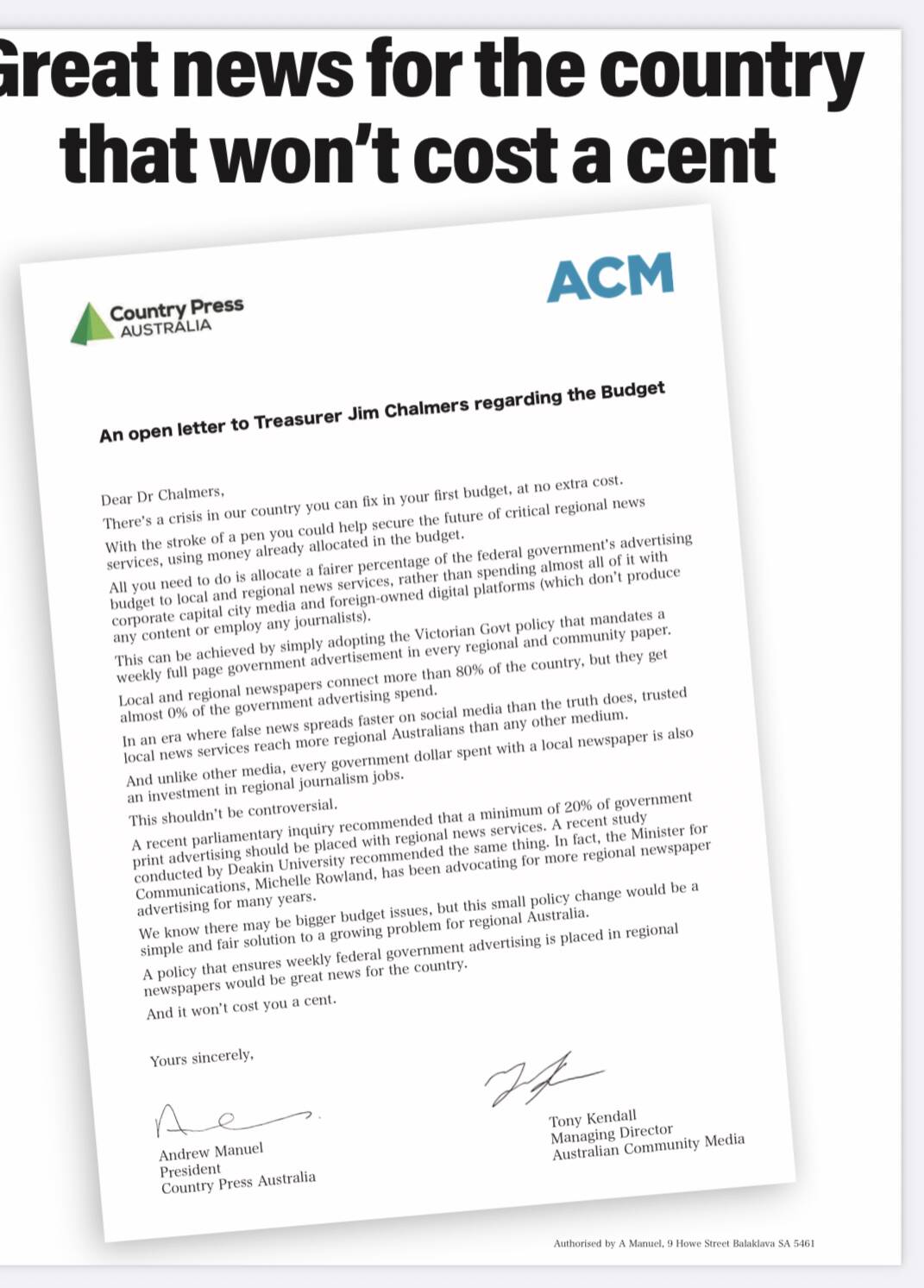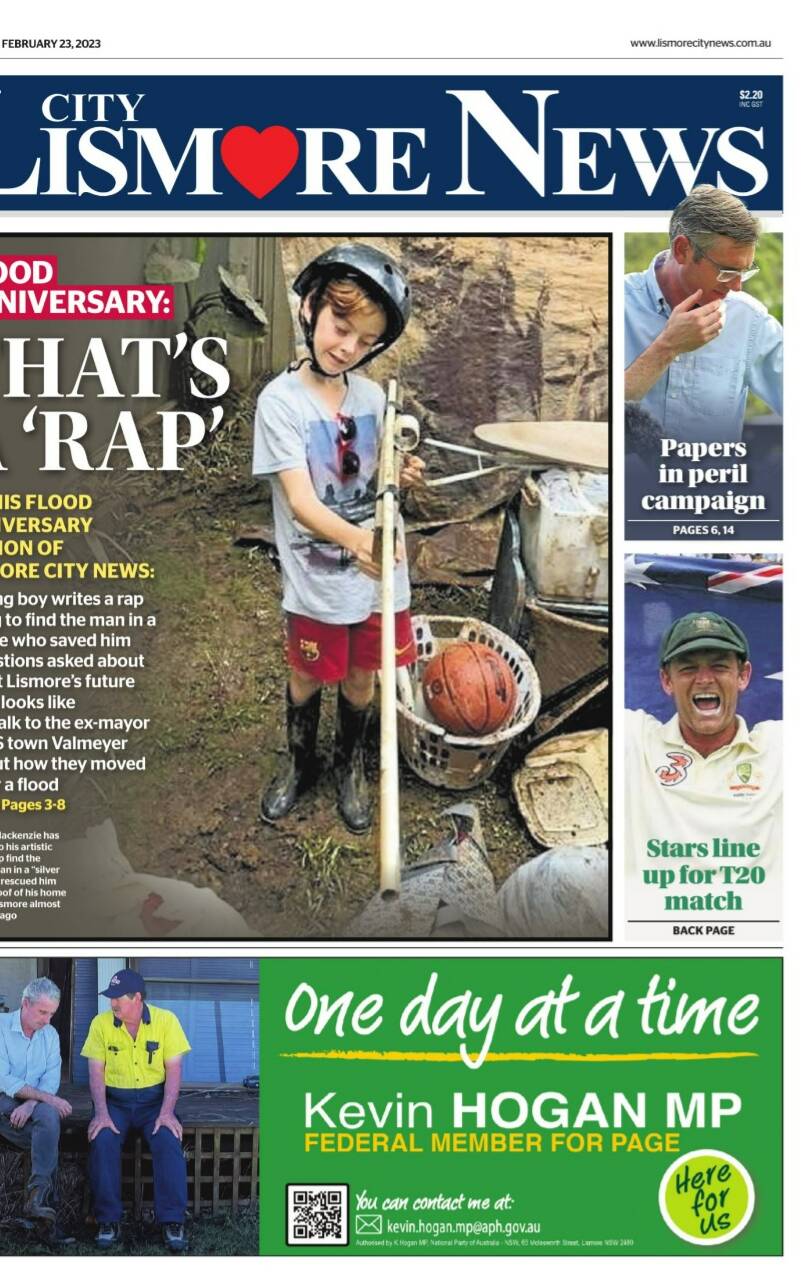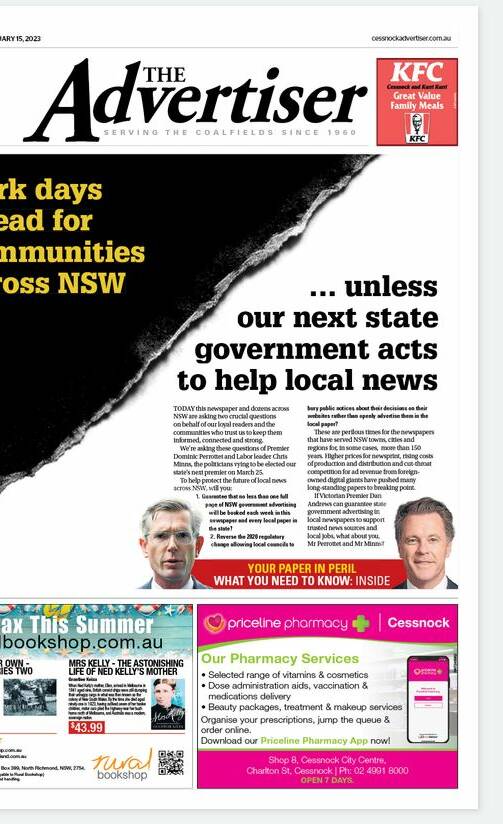
The publishers of hundreds of newspapers serving regional communities around Australia have called on the Albanese government to fix "a crisis in our country" by committing to guaranteed levels of federal government advertising in local newspapers.
Under the heading "Great news for the country that won't cost a cent", an open letter addressed to Treasurer Jim Chalmers ahead of next month's federal budget is appearing in more than 330 newspapers this week to propose a solution to what's described as "the dire outlook" for local news and regional journalism.
"All you need to do is allocate a fairer percentage of the federal government's advertising budget to local and regional news services, rather than spending almost all of it with corporate capital city media and foreign-owned digital platforms (which don't produce any content or employ any journalists)," the letter says.
Sent to the government last week, the letter is co-signed by Country Press Australia president Andrew Manuel and ACM managing director Tony Kendall.
ACM is the publisher of this masthead and Country Press Australia represents the owners of hundreds of small independent papers.

Mr Manuel said government intervention was required to "stem the dire outlook facing regional journalism", citing a Country Press Australia member who recently made five of his business' 12 journalists redundant and fears that more jobs may be lost.
"At a time where regional journalism is the most costly to produce, yet so vitally needed, federal government communications have all but ceased in our mediums," Mr Manuel, who runs The Plains Producer and other country papers in South Australia, said.
In their joint message to Dr Chalmers, Mr Manuel and Mr Kendall call on the government to adopt the same approach as Victoria's Labor Premier Daniel Andrews, who mandated that a weekly full page of state government advertising would appear in every regional and community paper.

"With the stroke of a pen you could help secure the future of critical regional news services, using money already allocated in the budget," the federal Treasurer is urged.
"We know there may be bigger budget issues, but this small policy change would be a simple and fair solution to a growing problem for regional Australia."
Before last month's NSW election, ACM's newspapers in the state petitioned the Labor and Liberal-National parties to make the same Dan Andrews pledge, with Labor eventually committing to spend an additional $3 million on government ads in regional print media.
Ahead of the last federal election, Labor committed to emergency funding to help regional newspapers cope with an 80 per cent jump in the cost of newsprint.
Mr Manuel and Mr Kendall see advertising as a more sustainable way for the federal government to support local newspapers beyond the major metropolitan cities, which "connect more than 80 per cent of the country, but they get almost zero per cent of the government advertising spend".

"In an era where false news spreads faster on social media than the truth does, trusted local news services reach more regional Australians than any other medium," their letter states. "And unlike other media, every government dollar spent with a local newspaper is also an investment in regional journalism jobs."
The letter notes that while Minister for Communications Michelle Rowland has been "advocating for more regional newspaper advertising for many years" the Albanese government has failed to act on the recommendations of the recent parliamentary inquiry into regional newspapers which endorsed industry calls for a minimum level of government print advertising budgets to be spent in regional newspapers.
"This shouldn't be controversial," they say.
The inquiry made 12 recommendations in 2022, including that advertising expenditure across all departments and agencies be reviewed with a view to ensuring a "cost-neutral" minimum of 20 per cent of government print advertising was placed in regional papers as "part of long-term advertising contracts that provide certainty of income for regional publications".
ACM's submission to the inquiry reasoned that such a commitment would not only contribute to a more sustainable future for regional media, "it would also demonstrate to country newspaper readers - the most highly engaged news consumers in the country - that their government knows they exist all year round and not just every election".







